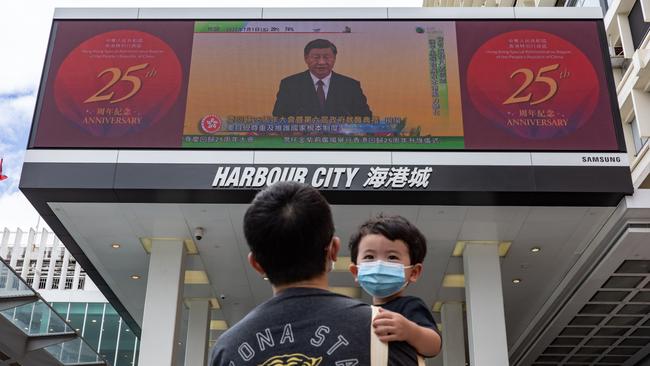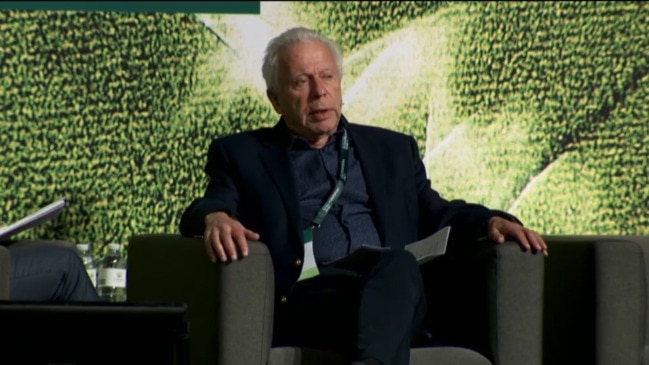‘White gold rush’ over as China’s birth rate plummets, hitting A2 Milk, Bubs and other Australian exporters
China’s birth rate has slumped to a record low, heralding the beginning of the end of the boom that propelled Australian infant formula makers to riches.

China’s birth rate has slumped to a record low, heralding the beginning of the end of the ‘‘white gold rush’’ that propelled Australian infant formula makers to riches.
In the past year, 9.6 million babies were born in China – a 10 per cent decrease on 2021. It remains the world’s biggest infant formula market but is not the pot of gold it once seemed.
A2 Milk’s share price dived more than 13.6 per cent to $4.27 on Monday after it warned China’s longer term birth rate was “inherently uncertain”.
Smaller rival Bubs was also swept up in the sell-off, with its shares plunging 5.1 per cent to 18c.
If Australian exporters need another reason to diversify away from China, this is it.
Since the pandemic began, trade with China has been in the spotlight for all the wrong reasons. Border closures, punitive trade tariffs and now fewer babies has increased the difficulty of doing business in China, according to Tim Harcourt, chief economist at the Institute for Public Policy and Governance at the University of Technology Sydney.
“I don’t think it was very easy but yes, the degree (of difficulty) has increased,” Professor Harcourt said. “We had a great era of China moving from being a nation of shippers to a nation of shoppers. That was around 2011, 2012, 2013. That’s gone through now and (Chinese President) Xi Jinping has moved militarily to the right and economically to the left, so there is more government intervention and ‘buy China first’ sort of stuff.”

Regulation in China has steadily increased since foreign infant formula companies flooded the market following the country’s melamine contamination scandal in 2008, which killed six babies and put another 54,000 in hospital.
In the past year, Beijing has introduced new national standards which are expected to limit the number of foreign brands that can sell products in China’s general trade – bricks and mortar retail – which accounts for about 85 per cent of the overall market.
A2 Milk is one of the few companies to obtain such registration but is still forecasting “low single digit” sales growth in China in the next 12 months, underscoring the scale of the challenge.
It is further evidence that China’s love affair with Australian products is waning, as Chemist Warehouse chairman Jack Gance said at The Australian’s Global Food Forum earlier this year.
A baby boom was widely expected following the end of China’s one child policy eight years ago.
But Professor Harcourt said the end of policy, which began in 1979, came too late.
“It was the official policy that really hurt people in rural areas but by the time they eased it, women were thinking career first, delaying babies because they wanted to have education and we also had this great demographic mismatch with them running out of wives,” he said.

Beijing is urgently looking to introduce a range of measures to lift the falling birth rate – including encouraging both parents to share child rearing. But paternity leave is still limited in most provinces.
For A2 chief executive David Bortolussi, the declining birth rate shifts the company’s strategy, with a greater focus on gaining market share.
A2 currently has about 3 per cent of what is known as the China label market – products which comply with the new national standard. This gives it an advantage over Bubs, which has yet to receive registration.
“We are about a No.8 player in the market and we’re the fastest growing international brand,” Mr Bortolussi said.
“So the market share opportunity for us in China label is significant. Like all markets, where you’ve got fairly fragmented brand and industry participants, that is consolidating quite significantly. The top 10 brands are gaining more share of the market.
“The level of concentration is increasing and there are definitely winners and losers in that, so I think we’re really well positioned to gain significant market share over time and that’s in essence what we need to do in a market that is declining and will hopefully stabilise.”
This compares with the company’s previous strategy that relied heavily in the lucrative daigou, or reseller market, which traditionally involved students and tourists buying products in Australia and sending them back to China, and later more organised groups known as “corporate daigous”.
While the daigou market was cheaper than conventional overseas distribution, the market ended almost overnight following pandemic international closures, wiping more than 75 per cent of A2’s market value, which at one point was twice as big as Qantas.
On Monday, A2 reported a 26.9 per cent increase in annual profit to $NZ155.6m ($143.7m) and a 10.1 per cent jump in revenue to $NZ1.59bn. Its China and other Asian segment accounted for the lion’s share, with sales increasing 37.9 per cent.







To join the conversation, please log in. Don't have an account? Register
Join the conversation, you are commenting as Logout